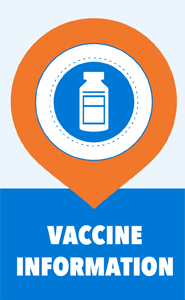Coronavirus disease 2019 (COVID-19) is a respiratory illness that spreads from person to person, mainly between people who are in close contact with one another (within about 6 feet) through respiratory droplets. Droplets are produced when an infected person speaks, sings, coughs or sneezes.
The COVID-19 virus is not that same as the coronaviruses that commonly circulate among humans and cause mild illness, like the common cold.
Everyone 6 months and older is eligible for a COVID-19 vaccine.
COVID-19 Symptoms
Mild symptoms of COVID-19 include fever, cough, headache, runny nose, loss of sense of smell/taste, sore throat, and/or diarrhea. If you have mild symptoms you should seek testing.
Call 9-1-1 or go to the emergency room if you have severe symptoms, including difficulty breathing, chest pain, confusion, or a fever that doesn't respond to medication.
 Test for COVID-19
Test for COVID-19
If you are experiencing COVID-19 symptoms, you should self-isolate and get tested.
If You Test Positive:
The updated Respiratory Virus Guidance recommends that people stay home and away from others until at least 24 hours after both their symptoms are getting better overall, and they have not had a fever (and are not using fever-reducing medication). Note that depending on the length of symptoms, this period could be shorter, the same, or longer than the previous guidance for COVID-19.
It is important to note that the guidance doesn’t end with staying home and away from others when sick. The guidance encourages added precaution over the next five days after time at home, away from others, is over. Since some people remain contagious beyond the “stay-at-home” period, a period of added precaution using prevention strategies, such as:
- Taking more steps for cleaner air;
- Enhancing hygiene practices;
- Wearing a well-fitting mask;
- Keeping a distance from others; and/or
- Getting tested for respiratory viruses can lower the chance of spreading respiratory viruses to others.
Learn how to prevent the spread of respiratory viruses like COVID-19 if you're sick.
Ask About Treatment
If you test positive and are an older adult or someone who is at high risk of getting very sick from COVID-19, treatment may be available. Contact a healthcare provider right away after a positive test, to determine if you are eligible, even if your symptoms are mild right now. You can also visit a Test to Treat location and, if eligible, receive a prescription from a provider. Don’t delay: treatment must be started within the first few days to be effective.
Treatments: Monoclonal Infusions
For Treatment
Omicron has numerous mutations in the spike protein that has reduced the efficacy of several of the monoclonal antibodies, especially bamlanivimab plus etesevimab and casirivimad plus imdevimab. Sotrovimab does have 85% hospitalization risk reduction against omicron. For referral to the Regional Infusion Center (RIC) for MAB treatment, click here.
For Preexposure Prophylaxis:
The MAC clinic is treating Central Texas patients eligible for Evusheld, a monoclonal antibody for preexposure prophylaxis used in adults and children 12y or older weighing at least 40kg, with moderate to severe immunocompromise or who receive immunosuppressive medications and may not mount an adequate response to a Covid-19 vaccination. Evusheld is not for treatment of Covid-19.
Providers are required to have a clinical conversation regarding risk and benefits with their patient before completing and submitting the referral form. For HIPAA compliant referral to the Prep MAC Clinic for Evusheld therapy, click here.
EVUSHELDTM – Clinical Considerations
- Not authorized for treatment of COVID-19, nor for post-exposure prophylaxis of COVID19 in individuals who have been exposed to someone infected with SARS-CoV-2.
- Pre-exposure prophylaxis with EVUSHELD is not a substitute for vaccination in individuals for whom COVID-19 vaccination is recommended.
- In individuals who have received a COVID-19 vaccine, EVUSHELD should be administered at least two weeks after vaccination.
- Examples of medical conditions or treatments that may result in moderate to severe immune compromise and an inadequate immune response to COVID-19 vaccination are provided in the Health Care Provider Fact Sheet.


